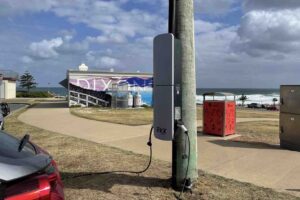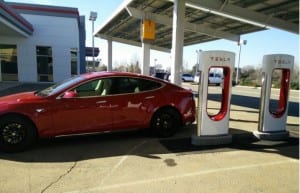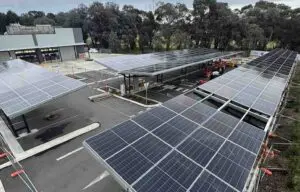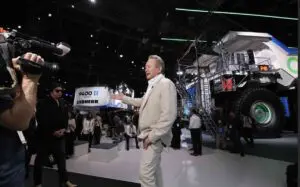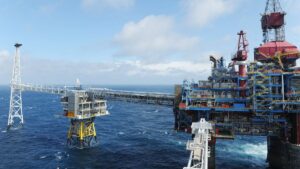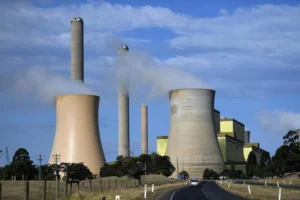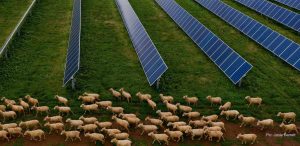There was a question raised during his recent visit to the Glasgow climate conference about whether prime minister Scott Morrison actually understood the issue around climate change. People wondered why, if he says he accepts the science of climate change, does he do virtually nothing to cut Australia’s emissions.
The same question can be asked about Morrison’s understanding of new technologies. He waved a lump of coal around parliament, dismissed renewables because he wanted to focus on “fair dinkum” power, mocked battery storage, and claimed electric vehicles would ruin the weekend.
Clearly, he and his minders, and the energy and emissions reduction minister Angus Taylor, still don’t get it.
“Australians love their family sedan, farmers rely on their trusted ute and our economy counts on trucks and trains to deliver goods from coast to coast,” he said in a statement on Wednesday accompanying what is laughingly called the country’s Future Fuels Strategy, or FFS for short.
“We will not be forcing Australians out of the car they want to drive or penalising those who can least afford it through bans or taxes. Instead, the Strategy will work to drive down the cost of low and zero emission vehicles, and enhance consumer choice.”
Morrison and his team haven’t caught up with recent trends. Australians have moved on from their family sedan and have migrated to big, heavy, highly polluting SUVs. They are desperate to shift to EVs, if only they had the range of models to choose from.
The people who are being penalised the most by the country’s inaction are those who have no choice but to buy the dirty and inefficient internal combustion engine cars that land on these shores because of the complete lack of vehicle or fuel standards.
Australia is not about to change that. It remains virtually the only western economy to allow the dirtiest fuel and the dirtiest engines on to its roads, at huge cost to health, and to consumers, who pay an average $600 more in fuel than they should do because of the dirty and inefficient fuels and engines.
The government reckons the electric vehicles will make up just 30 per cent of total new car sales by 2030. But again, it’s kidding itself. Exactly what sort of cars do they expect Australians to buy in 10 years time?
The choice of petrol and diesel cars will be vastly reduced. Most major brands will have already stopped making fossil fuel cars altogether by then, because most major countries will have banned such sales.
Morrison says the government is focusing on supporting fleets to adopt EVs. That is actually smart and was the centrepiece of the Labor EV policy the Coalition derided at the last election. Labor realised EVs already make financial sense for fleet owners, and that will create a much needed second hand EV market.
But Morrison should start with the government’s own fleet, both the Commcar fleet and the cars that MPs are allowed to choose as part of their packages.
Bill Shorten, as we reported in The Driven, our EV-focused sister site, was the first federal MP to get an EV under this scheme, but he had to move heaven and earth to do so. It shouldn’t be so hard, and Shorten says it is clear he will be saving money because the running costs are so low.
The Commcar fleet has just two EVs in its fleet. State government fleets have promised to move to full electric by 2030, including in the ACT, NSW and Victoria.
The most striking part of the federal “plan” is the lack of any incentives to purchase EVs. Morrison is convinced that this puts it on a par with rooftop solar.
“Just as Australians have taken their own decision to embrace roof-top solar at the highest rate in the world, when new vehicle technologies are cost competitive Australians will embrace them too,” he spinned.
This comment makes absolutely no sense.
Yes, rooftop solar is cost competitive, very much so, but it has been generously supported by federal rebates and continues to be. That has delivered widespread benefits, both in decarbonising the grid, bringing down the overall cost of electricity, and pushing dirty coal out the back door.
But it didn’t happen without federal government support. Some argue that should be wound back now and any support directed to lower income households, but any realistic assessment of the EV industry shows that initial support packages are crucial.
And that’s the big problem with the Coalition government’s thinking about climate, energy and transport. It’s dancing around the issues, for fears of upsetting powerful lobby groups, the fossil fuel sector, and industry incumbents.
It could help accelerate the transition to a decarbonised grid by 2035 – because the Australian Energy Market Operator, whose job is to keep the lights on – actually has a real plan to do that.
It could support the transition to an electrified fleet, because it would not just cut emissions, improve health outcomes, and save money, and it would also help eliminate a $20 billion import fuel bill and the strategic issues that go around that.
Instead, it appears to be in thrall of technologies that don’t yet exist – like carbon capture and storage, hydrogen cars, and small modular reactors – because for some reason it doesn’t like the one that are present now, but threaten to massively disrupt the business models of big industry.
And in the meantime, its policies, such as they are, just keep spinning. Morrison is even trying to pretend he didn’t oppose EVs in the last election.
Remember this? “I mean if you have an electric car and you live in an apartment, are you going to run the extension cord down from your fourth floor window?”
Morrison says there has, since then, been a massive change in technology in the intervening years. They’ll even tow the boat, and the caravan. But that doesn’t stop Morrison for hanging on to technologies that are not quite there.
The FFS was launched at a hydrogen refuelling centre operated by Toyota, a huge multi-national that has been one of the most vociferous opponents against vehicle and fuel emissions standards, both here and overseas. Some times the government doesn’t even know how to pretend it cares.
See also Bridie Schmidt’s report on the details and reaction on The Driven. You can read it here. FFS: Coalition’s EV policy fizzes out with no grand plan and no emissions limits.


